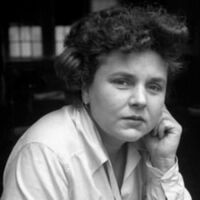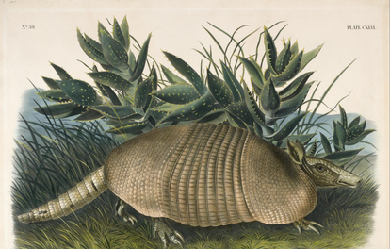The Burglar of Babylon
On the fair green hills of Rio
There grows a fearful stain:
The poor who come to Rio
And can’t go home again.
On the hills a million people,
A million sparrows, nest,
Like a confused migration
That’s had to light and rest,
Building its nests, or houses,
Out of nothing at all, or air.
You’d think a breath would end them,
They perch so lightly there.
But they cling and spread like lichen,
And people come and come.
There’s one hill called the Chicken,
And one called Catacomb;
There’s the hill of Kerosene,
And the hill of Skeleton,
The hill of Astonishment,
And the hill of Babylon.
Micuçú was a burglar and killer,
An enemy of society.
He had escaped three times
From the worst penitentiary.
They don’t know how many he murdered
(Though they say he never raped),
And he wounded two policemen
This last time he escaped.
They said, “He’ll go to his auntie,
Who raised him like a son.
She has a little drink shop
On the hill of Babylon.”
He did go straight to his auntie,
And he drank a final beer.
He told her, “The soldiers are coming,
And I’ve got to disappear.”
“Ninety years they gave me.
Who wants to live that long?
I’ll settle for ninety hours,
On the hill of Babylon.
”Don’t tell anyone you saw me.
I’ll run as long as I can.
You were good to me, and I love you,
But I’m a doomed man."
Going out, he met a mulata
Carrying water on her head.
“If you say you saw me, daughter,
You’re as good as dead.”
There are caves up there, and hideouts,
And an old fort, falling down.
They used to watch for Frenchmen
From the hill of Babylon.
Below him was the ocean.
It reached far up the sky,
Flat as a wall, and on it
Were freighters passing by,
Or climbing the wall, and climbing
Till each looked like a fly,
And then fell over and vanished;
And he knew he was going to die.
He could hear the goats baa—baa—ing.
He could hear the babies cry;
Fluttering kites strained upward;
And he knew he was going to die.
A buzzard flapped so near him
He could see its naked neck.
He waved his arms and shouted,
“Not yet, my son, not yet!”
An Army helicopter
Came nosing around and in.
He could see two men inside it,
but they never spotted him.
The soldiers were all over,
On all sides of the hill,
And right against the skyline
A row of them, small and still.
Children peeked out of windows,
And men in the drink shop swore,
And spat a little cachaça
At the light cracks in the floor.
But the soldiers were nervous, even
with tommy guns in hand,
And one of them, in a panic,
Shot the officer in command.
He hit him in three places;
The other shots went wild.
The soldier had hysterics
And sobbed like a little child.
The dying man said, “Finish
The job we came here for.”
he committed his soul to God
And his sons to the Governor.
They ran and got a priest,
And he died in hope of Heaven
—A man from Pernambuco,
The youngest of eleven.
They wanted to stop the search,
but the Army said, “No, go on,”
So the soldiers swarmed again
Up the hill of Babylon.
Rich people in apartments
Watched through binoculars
As long as the daylight lasted.
And all night, under the stars,
Micuçú hid in the grasses
Or sat in a little tree,
Listening for sounds, and staring
At the lighthouse out at sea.
And the lighthouse stared back at him,
til finally it was dawn.
He was soaked with dew, and hungry,
On the hill of Babylon.
The yellow sun was ugly,
Like a raw egg on a plate—
Slick from the sea. He cursed it,
For he knew it sealed his fate.
He saw the long white beaches
And people going to swim,
With towels and beach umbrellas,
But the soldiers were after him.
Far, far below, the people
Were little colored spots,
And the heads of those in swimming
Were floating coconuts.
He heard the peanut vendor
Go peep—peep on his whistle,
And the man that sells umbrellas
Swinging his watchman’s rattle.
Women with market baskets
Stood on the corners and talked,
Then went on their way to market,
Gazing up as they walked.
The rich with their binoculars
Were back again, and many
Were standing on the rooftops,
Among TV antennae.
It was early, eight or eight—thirty.
He saw a soldier climb,
Looking right at him. He fired,
And missed for the last time.
He could hear the soldier panting,
Though he never got very near.
Micuçú dashed for shelter.
But he got it, behind the ear.
He heard the babies crying
Far, far away in his head,
And the mongrels barking and barking.
Then Micuçú was dead.
He had a Taurus revolver,
And just the clothes he had on,
With two contos in the pockets,
On the hill of Babylon.
The police and the populace
Heaved a sigh of relief,
But behind the counter his auntie
Wiped her eyes in grief.
"We have always been respected.
My shop is honest and clean.
I loved him, but from a baby
Micuçú was mean.
“We have always been respected.
His sister has a job.
Both of us gave him money.
Why did he have to rob?
”I raised him to be honest,
Even here, in Babylon slum."
The customers had another,
Looking serious and glum.
But one of them said to another,
When he got outside the door,
“He wasn’t much of a burglar,
He got caught six times—or more.”
This morning the little soldiers
are on Babylon hill again;
Their gun barrels and helmets
Shine in a gentle rain.
Micuçú is buried already.
They’re after another two,
But they say they aren’t as dangerous
As the poor Micuçú.
On the green hills of Rio
There grows a fearful stain:
The poor who come to Rio
And can’t go home again.
There’s the hill of Kerosene,
And the hill of the Skeleton,
The hill of Astonishment,
And the hill of Babylon.







